Unit3.ppt.Convertor
- 格式:doc
- 大小:90.50 KB
- 文档页数:8
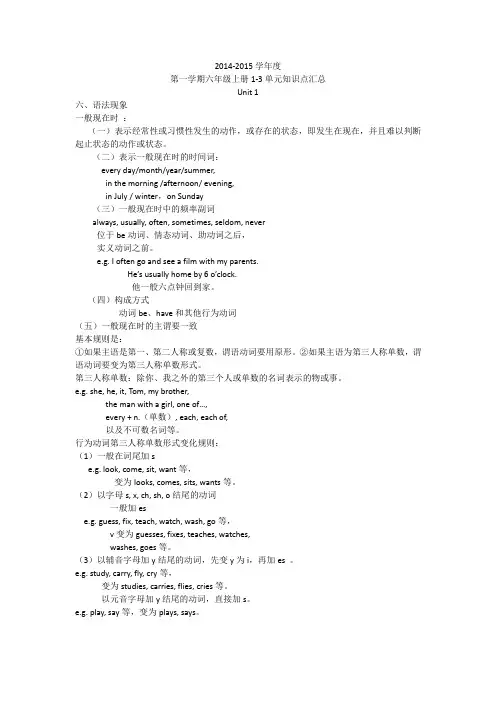
2014-2015学年度第一学期六年级上册1-3单元知识点汇总Unit 1六、语法现象一般现在时:(一)表示经常性或习惯性发生的动作,或存在的状态,即发生在现在,并且难以判断起止状态的动作或状态。
(二)表示一般现在时的时间词:every day/month/year/summer,in the morning /afternoon/ evening,in July / winter,on Sunday(三)一般现在时中的频率副词always, usually, often, sometimes, seldom, never位于be动词、情态动词、助动词之后,实义动词之前。
e.g. I often go and see a film with my parents.He’s usually home by 6 o’clock.他一般六点钟回到家。
(四)构成方式动词be、have和其他行为动词(五)一般现在时的主谓要一致基本规则是:①如果主语是第一、第二人称或复数,谓语动词要用原形。
②如果主语为第三人称单数,谓语动词要变为第三人称单数形式。
第三人称单数:除你、我之外的第三个人或单数的名词表示的物或事。
e.g. she, he, it, Tom, my brother,the man with a girl, one of…,every + n.(单数), each, each of,以及不可数名词等。
行为动词第三人称单数形式变化规则:(1)一般在词尾加se.g. look, come, sit, want等,变为looks, comes, sits, wants等。
(2)以字母s, x, ch, sh, o结尾的动词一般加ese.g. guess, fix, teach, watch, wash, go等,v变为guesses, fixes, teaches, watches,washes, goes等。
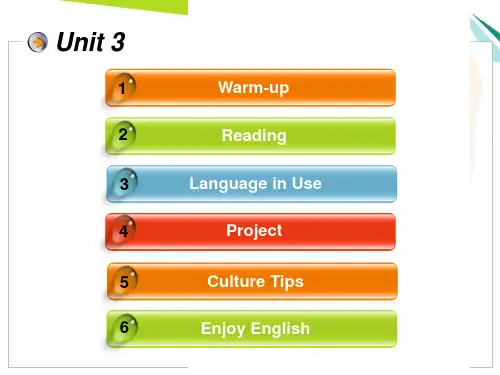
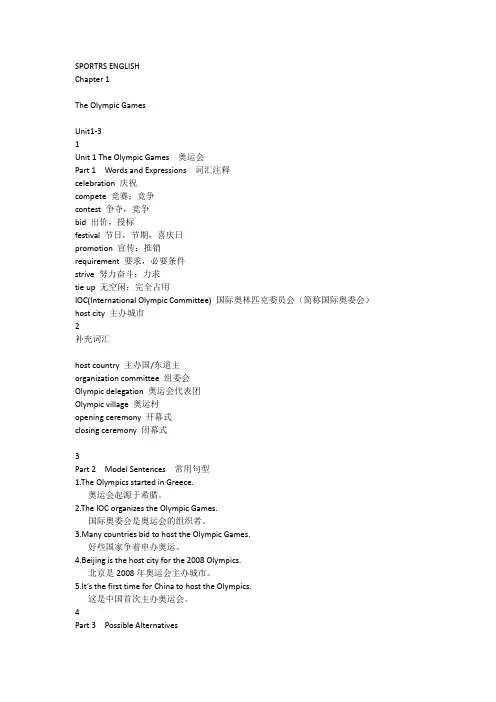
SPORTRS ENGLISHChapter 1The Olympic GamesUnit1-31Unit 1 The Olympic Games 奥运会Part 1 Words and Expressions 词汇注释celebration 庆祝compete 竞赛;竞争contest 争夺,竞争bid 出价,投标festival 节日,节期,喜庆日promotion 宣传;推销requirement 要求,必要条件strive 努力奋斗;力求tie up 无空闲;完全占用IOC(International Olympic Committee) 国际奥林匹克委员会(简称国际奥委会)host city 主办城市2补充词汇host country 主办国/东道主organization committee 组委会Olympic delegation 奥运会代表团Olympic village 奥运村opening ceremony 开幕式closing ceremony 闭幕式3Part 2 Model Sentences 常用句型1.The Olympics started in Greece.奥运会起源于希腊。
2.The IOC organizes the Olympic Games.国际奥委会是奥运会的组织者。
3.Many countries bid to host the Olympic Games.好些国家争着申办奥运。
4.Beijing is the host city for the 2008 Olympics.北京是2008年奥运会主办城市。
5.It’s the first t ime for China to host the Olympics.这是中国首次主办奥运会。
4Part 3 Possible Alternatives动感替换句型 1in 776 BC.The Olympics started as a festival.as a celebration of harvestand peace.始于公元前776年。
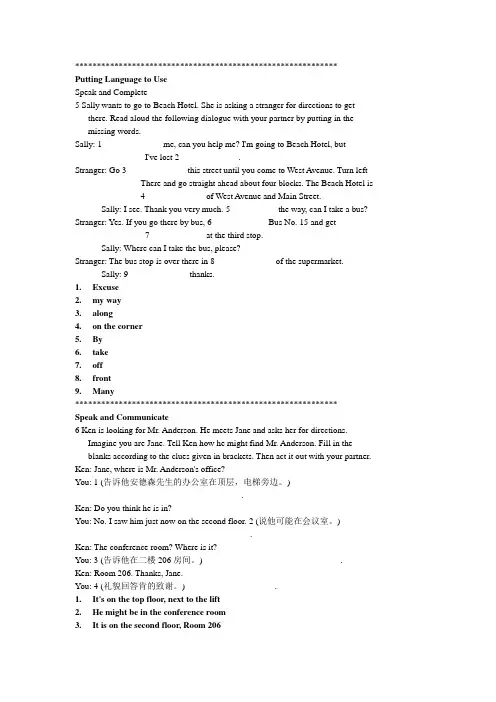
************************************************************Putting Language to UseSpeak and Complete5 Sally wants to go to Beach Hotel. She is asking a stranger for directions to getthere. Read aloud the following dialogue with your partner by putting in themissing words.Sally: 1 _____________ me, can you help me? I'm going to Beach Hotel, butI've lost 2 _____________.Stranger: Go 3 _____________ this street until you come to West Avenue. Turn left There and go straight ahead about four blocks. The Beach Hotel is4 _____________ of West Avenue and Main Street.Sally: I see. Thank you very much. 5 __________ the way, can I take a bus? Stranger: Yes. If you go there by bus, 6 ____________ Bus No. 15 and get7 ____________ at the third stop.Sally: Where can I take the bus, please?Stranger: The bus stop is over there in 8 _____________ of the supermarket.Sally: 9 _____________ thanks.1.Excuse2.my way3.along4.on the corner5.By6.take7.off8.front9.Many************************************************************Speak and Communicate6 Ken is looking for Mr. Anderson. He meets Jane and asks her for directions.Imagine you are Jane. Tell Ken how he might find Mr. Anderson. Fill in theblanks according to the clues given in brackets. Then act it out with your partner. Ken: Jane, where is Mr. Anderson's office?You: 1 (告诉他安德森先生的办公室在顶层,电梯旁边。
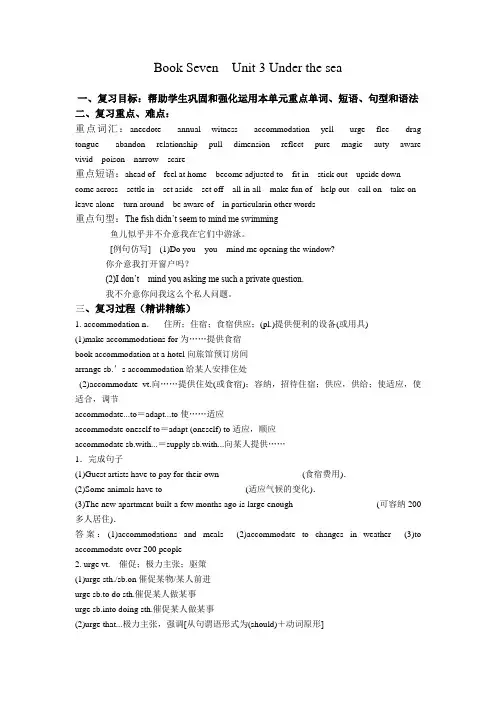
Book Seven Unit 3 Under the sea一、复习目标:帮助学生巩固和强化运用本单元重点单词、短语、句型和语法二、复习重点、难点:重点词汇:anecdote annual witness accommodation yell urge flee drag tongue abandon relationship pull dimension reflect pure magic auty aware vivid poison narrow scare重点短语:ahead of feel at home become adjusted to fit in stick out upside down come across settle in set aside set off all in all make fun of help out call on take on leave alone turn around be aware of in particularin other words重点句型:The fish didn’t seem to mind me swimming鱼儿似乎并不介意我在它们中游泳。
[例句仿写](1)Do you you mind me opening the window?你介意我打开窗户吗?(2)I don’t mind you asking me such a private question.我不介意你问我这么个私人问题。
三、复习过程(精讲精练)1. accommodation n.住所;住宿;食宿供应;(pl.)提供便利的设备(或用具)(1)make accommodations for为……提供食宿book accommodation at a hotel向旅馆预订房间arrange sb.’s accommodation给某人安排住处(2)accommodate vt.向……提供住处(或食宿);容纳,招待住宿;供应,供给;使适应,使适合,调节accommodate...to=adapt...to使……适应accommodate oneself to=adapt (oneself) to适应,顺应accommodate sb.with...=supply sb.with...向某人提供……1.完成句子(1)Guest artists have to pay for their own __________________ (食宿费用).(2)Some animals have to _____________ _____(适应气候的变化).(3)The new apartment built a few months ago is large enough __________________ (可容纳200多人居住).答案:(1)accommodations and meals(2)accommodate to changes in weather(3)to accommodate over 200 people2. urge vt.催促;极力主张;驱策(1)urge sth./sb.on催促某物/某人前进urge sb.to do sth.催促某人做某事urge sb.into doing sth.催促某人做某事(2)urge that...极力主张,强调[从句谓语形式为(should)+动词原形]It is urged that...坚决要求……[从句谓语形式为(should)+动词原形]2.完成句子(1)He ________________________ (要求所有学生参加这次活动).(2)I urged ________________________ (他要尽自己最大的努力).(3)__________________ (有人极力主张) he should be punished.(4)The class is discussing a newspaper editorial (社论) that __________________ (敦促市民们帮助) reduce the noise and air pollution in the city.答案:(1)urged all the students to take part in this activity (2)that he (should) do his best(3)It was urged that(4)urges citizens to help3. abandon vt.遗弃;抛弃;丢弃;放弃;中止;(与oneself连用)使放纵,使听任n.放任;放纵(1)abandon one’s hope/plan/idea放弃希望/计划/主意abandon oneself to...沉湎于……,纵情于……abandon doing sth.放弃做某事(2)abandoned adj.无约束的;无度的;放荡的with abandon放纵地;放任地3.完成句子(1)The child __________________(被父母遗弃了).(2)She ___________________(陷入绝望).(3)The crew __________________(离开了燃烧着的船).(4)有些年轻人纵情享乐而无所事事。
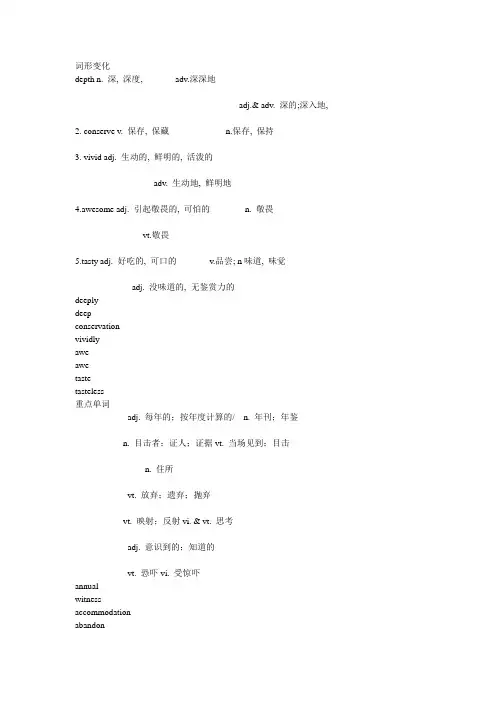
depth n. 深, 深度,_______ adv.深深地_____ adj.& adv. 深的;深入地,2. conserve v. 保存, 保藏_____________n.保存, 保持3. vivid adj. 生动的, 鲜明的, 活泼的_____________adv. 生动地, 鲜明地4.awesome adj. 引起敬畏的, 可怕的________n. 敬畏___________ vt.敬畏5.tasty adj. 好吃的, 可口的_______ v.品尝; n味道, 味觉_________adj. 没味道的, 无鉴赏力的deeplydeepconservationvividlyaweawetastetasteless重点单词____________adj. 每年的;按年度计算的/ n. 年刊;年鉴___________n. 目击者;证人;证据vt. 当场见到;目击________________n. 住所____________vt. 放弃;遗弃;抛弃___________vt. 映射;反射vi. & vt. 思考____________adj. 意识到的;知道的____________vt. 恐吓vi. 受惊吓annualwitnessaccommodationabandonawarescare重点词组______________整理;挑出______________帮助……(摆脱困难或危难);协助;使……脱离困境____________________ 跃出________________上下翻转过来sort outhelp outthrow oneself out ofupside down词语辨析练习】选择shore/seaside/beach/coast或bank并用其适当的形式填空Last summer we spent all our holiday at the _______.2) I enjoy lying on the _______ with sunglasses in the sun.3) It’s dangerous for children to play on the _______ of the river.4) We often see many ships on the sea about several miles off the ______.5) The land is barren on the east ______.【练习】选择flee或escape,并用其适当的形式填空1) The enemy ______ in disorder.2) Citizens were forced to ______ the besieged city.3) He narrowly _________ death.seasidebeachbankshorecoastfledfleeescaped【练习】选择deep或deeply并用其适当的形式填空The police found out the lost child _______ in the woodsat last.2) All of us were _______ shocked at the bad news.【练习】根据句子结构,用括号内所提供词的适当形式填空The lake is over 20 meters in _____ so we were all moved______ by the man who dived _______ into the lake tosave the little boy. (deep)2) I ____ remember the girl dressed in ______ color he drewin the exhibition. (vivid)3) Anyone who launches a war is ______ and is _______ bypeople who love peace all around the world. (awe)4) The _______ of energy will help us research the way tosave and _______ the energy. (conserve)5) Though the soup is _______, I’ve lost my sense of ______and it ____just like ______water.(taste)deepdeeply1) depth; deeply; deep2) vividly; vivid3) awesome; awed4) conservation; conserve5) tasty; taste; tastes; tasteless重点词汇1. annual adj. 每年的;按年度计算的/ n. 年刊;年鉴;年会[重点用法]annually adv. 年年地, 每年地[典例]1) an annual income. ______________2) an annual report ________________3) Premier Wen Jiabao noted that the two most importantproblems would be previous to anything else_______________________________.温家宝总理在政府年度报告中指出要优先解决这两大问题。
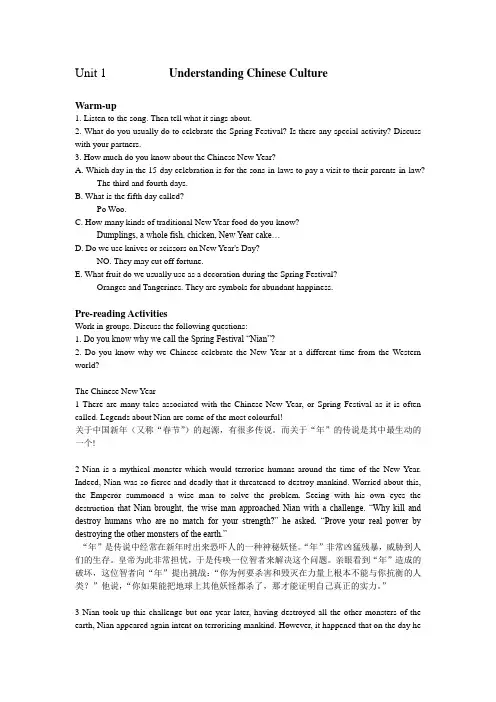
Unit 1 Understanding Chinese CultureWarm-up1. Listen to the song. Then tell what it sings about.2. What do you usually do to celebrate the Spring Festival? Is there any special activity? Discuss with your partners.3. How much do you know about the Chinese New Year?A. Which day in the 15-day celebration is for the sons-in-laws to pay a visit to their parents-in-law?The third and fourth days.B. What is the fifth day called?Po Woo.C. How many kinds of traditional New Year food do you know?Dumplings, a whole fish, chicken, New Year cake…D. Do we use knives or scissors on New Year's Day?NO. They may cut off fortune.E. What fruit do we usually use as a decoration during the Spring Festival?Oranges and Tangerines. They are symbols for abundant happiness.Pre-reading ActivitiesWork in groups. Discuss the following questions:1. Do you know why we call the Spring Festival “Nian”?2. Do you know why we Chinese celebrate the New Year at a different time from the Western world?The Chinese New Year1 There are many tales associated with the Chinese New Year, or Spring Festival as it is often called. Legends about Nian are some of the most colourful!关于中国新年(又称“春节”)的起源,有很多传说。
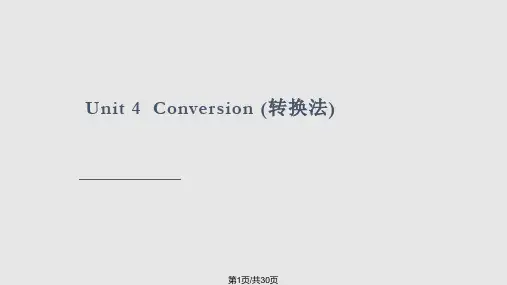
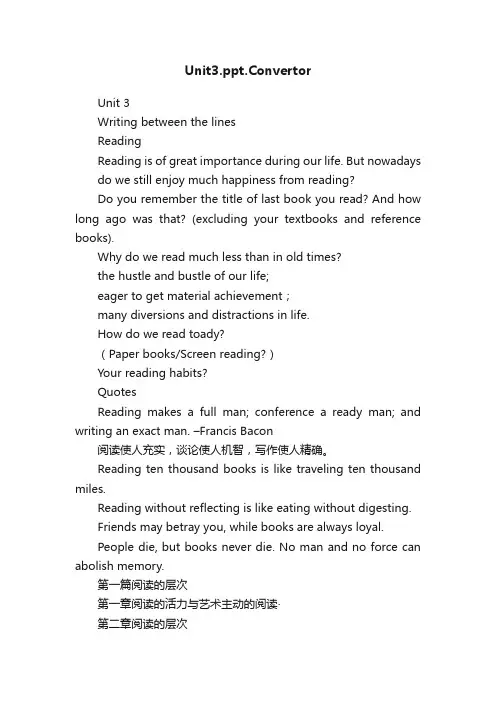
Unit3.ppt.ConvertorUnit 3Writing between the linesReadingReading is of great importance during our life. But nowadays do we still enjoy much happiness from reading?Do you remember the title of last book you read? And how long ago was that? (excluding your textbooks and reference books).Why do we read much less than in old times?the hustle and bustle of our life;eager to get material achievement;many diversions and distractions in life.How do we read toady?(Paper books/Screen reading?)Your reading habits?QuotesReading makes a full man; conference a ready man; and writing an exact man. –Francis Bacon阅读使人充实,谈论使人机智,写作使人精确。
Reading ten thousand books is like traveling ten thousand miles.Reading without reflecting is like eating without digesting.Friends may betray you, while books are always loyal.People die, but books never die. No man and no force can abolish memory.第一篇阅读的层次第一章阅读的活力与艺术主动的阅读·第二章阅读的层次第三章阅读的第一个层次:基础阅读第四章阅读的第二个层次:检视阅读第五章如何做一个自我要求的读者第二篇阅读的第三个层次:分析阅读第六章一本书的分类第七章透视一本书结构与规划第八章与作者找出共通的词义第九章判断作者的主旨第十章公正地评断一本书第十一章赞同或反对作者第十二章辅助阅读第三篇阅读不同读物的方法第十三章如何阅读实用型的书第十四章如何阅读想像文学第十五章阅读故事、戏剧与诗的一些建议第十六章如何阅读历史书第十七章如何阅读科学与数学第十八章如何阅读哲学书第十九章如何阅读社会科学第四篇阅读的最终目标第二十章阅读的第四个层次第二十一章阅读与心智的成长Read between the lines vs write between the linesWhat might this phrase mean?Are the two phrases in any way related to each other?Should the phrase write between the lines be taken literally or figuratively?What does the writer mean by writing between the lines?read between the lines“find more meanings from a text that are not actually stated,but implied”.Read between the lines vs write between the linesWrite between the linesThe writer has invented this phrase by following the pattern of the set phrase read between the lines and replacing read with write to stress the importance of writing notes and comments in the book one is reading.In spite of the word “writing” in the title, this essay is actually a piece of good advic e on how to “read” efficiently.The Main Idea 1General ReadingIs the writer for or against writing between the lines?What is his chief argument?The writer is trying to persuade the reader to write down in the book he is reading his reactions to the tex t. The reader’s reactions may include his questions, his agreements or differences of opinion with the author, his doubts and so on. In this way the reader will be doing the most efficient kind of reading.introductionThesis statement: ( para.1—2 )Unless you do, you are not likely to do the most efficient kind of reading.Be likely to do sth.=very probably do sth.She is not likely to come to the party in this rain as she lives miles away from here.bluntly -1Bluntly(4):adv. 1.speaking in a direct honest way that sometimes upsets people直率地adj. bluntTo put it bluntly/to be blunt, she's not up to the job.说实话,她不能胜任这项工作。
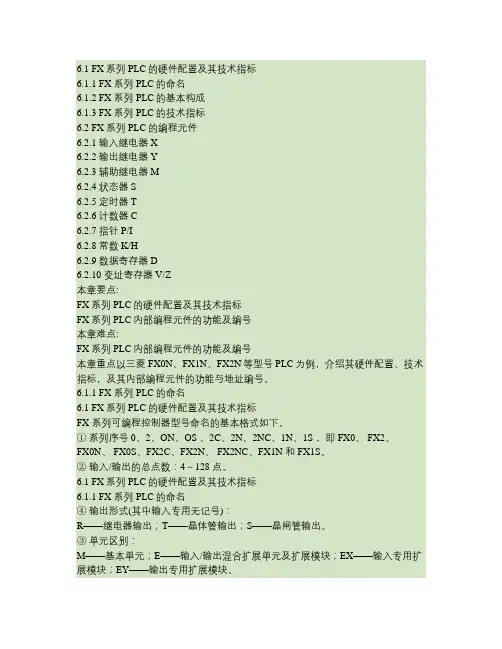
6.1 FX系列PLC的硬件配置及其技术指标6.1.1 FX 系列PLC的命名6.1.2 FX 系列PLC的基本构成6.1.3 FX 系列PLC的技术指标6.2 FX系列PLC的编程元件6.2.1 输入继电器X6.2.2 输出继电器Y6.2.3 辅助继电器M6.2.4 状态器S6.2.5 定时器T6.2.6 计数器C6.2.7 指针P/I6.2.8 常数K/H6.2.9 数据寄存器D6.2.10 变址寄存器V/Z本章要点:FX系列PLC的硬件配置及其技术指标FX系列PLC内部编程元件的功能及编号本章难点:FX系列PLC内部编程元件的功能及编号本章重点以三菱FX0N、FX1N、FX2N等型号PLC为例,介绍其硬件配置、技术指标,及其内部编程元件的功能与地址编号。
6.1.1 FX 系列PLC的命名6.1 FX系列PLC的硬件配置及其技术指标FX 系列可编程控制器型号命名的基本格式如下。
①系列序号0、2、ON、OS 、2C、2N、2NC、1N、1S ,即 FX0、 FX2、FX0N、 FX0S、FX2C、FX2N、 FX2NC、FX1N 和FX1S。
②输入/输出的总点数:4~128 点。
6.1 FX系列PLC的硬件配置及其技术指标6.1.1 FX 系列PLC的命名④输出形式(其中输入专用无记号):R——继电器输出;T——晶体管输出;S——晶闸管输出。
③单元区别:M——基本单元;E——输入/输出混合扩展单元及扩展模块;EX——输入专用扩展模块;EY——输出专用扩展模块。
6.1 FX系列PLC的硬件配置及其技术指标6.1.1 FX 系列PLC的命名⑤特殊物品的区别D:DC电源,DC输入。
A1:AC电源,AC输入(AC100-120V)或AC输入模块。
H:大电流输出扩展模块。
V:立式端子排的扩展模式。
C:接插口输入输出方式。
F:输入滤波器1 ms的扩展模块。
L:TTL输入型模块。
S:独立端子(无公共端)扩展模块。

unit4[1][1].ppt.ConvertorUnit 4 Inaugural AddressPresentations:1. John Fitzgerald Kennedy2. International situations and international affairs with the involvement of USA at the timeText type: political speechObjective of a political speech--to explain--to convince--to persuadeHow to write a political speech?The history of Inaugural Address:[1] On April 30, 1798, George Washington stepped onto a balcony of Federal Hall in NY city, placed his hand on a Bible and swore to “preserve, protect and defend the Constitution of the United States.” He then read an earnest speech, calling for “united and effective government”. Thus began a unique American institution—Inauguration Day—those dramatic hours when a new president faces the people for the fist time.[2] The presidential oath, traditionally administered by the chief justice, is prescribed in Article II, section 1, of the Constitution. The incoming vice-president takes a similar oath. The ceremonies attending the swearing-in are extra-constitutional. Presidents who succeeded to the office on the death of the incumbent have been sworn in speedily and without ceremony.The Background of this Inaugural Speech:[1]. Kennedy became president during the cold war periodwhen the world was divided into two hostile camps—North Atlantic Treaty Organization &Warsaw Treaty Organization;[2].The United States, the self-appointed leader of the “free democracies”, is prepared to pay any price to defend human rights and the liberty and independence of free nations.[3] statements by Kennedy before his presidencyParagraph 1Questions:1. what do the following dictions imply: “victory”, “a celebration of freedom”, “an end” , “a beginning”, “renewal” and “change”?2. what does “the same solemn oath our forebears prescribed nearly a centur y and three-quarters ago” indicate? What?s the content of “the same solemn oath”?Words and expressions:1. observe: celebrate;关于“看”的词汇2. symbolize:3. signify:4. forebear:5. prescribe: declare with authority that something is rule that shall be followed; set down;state; stipulate按规定货物须在三日内送交.It is prescribed that goods should be delivered within three days.Paragraph 2:1. What devices does the speaker use to create emotional impact?2. For what reasons that the speaker think the world is very different now?3. What?s the purpose of placing this paragraph at the beginning of the speech?Words and expressions:1. abolish:2. at issue: in dispute; still to be decided;in a state of controversy : in disagreement3.around the globe4. And yet the same revolutionary belief for which our forebears fought is still at issue around the globe, the belief that the rights of man come not from the generosity of the state but from the hand of God.Quiz 1Translate the following sentences:1. 那个国家的人过圣诞节吗?Do they observe Christmas Day in that country?2. 我们举行宴会庆祝我们的成功.We held a party to observe our success.3. 有乌云是否显示要下雨? Do dark clouds signify rain?这些符号表示什么意思?What do these marks signify?4.那诗人用花象征他的爱人.The poet has symbolized his lover with a flower.5.争论点是我们是否应去参加聚会The point at issue is whether we should go to the party.The nationality of the minority groups in that country is still at issue.那个国家的少数民族的国籍,仍有争论。
Unit 3Writing between the linesReadingReading is of great importance during our life. But nowadaysdo we still enjoy much happiness from reading?Do you remember the title of last book you read? And how long ago was that? (excluding your textbooks and reference books).Why do we read much less than in old times?the hustle and bustle of our life;eager to get material achievement;many diversions and distractions in life.How do we read toady?(Paper books/Screen reading?)Your reading habits?QuotesReading makes a full man; conference a ready man; and writing an exact man. –Francis Bacon阅读使人充实,谈论使人机智,写作使人精确。
Reading ten thousand books is like traveling ten thousand miles.Reading without reflecting is like eating without digesting.Friends may betray you, while books are always loyal.People die, but books never die. No man and no force can abolish memory.第一篇阅读的层次第一章阅读的活力与艺术主动的阅读·第二章 阅读的层次第三章 阅读的第一个层次:基础阅读第四章 阅读的第二个层次:检视阅读第五章如何做一个自我要求的读者第二篇 阅读的第三个层次:分析阅读第六章一本书的分类第七章 透视一本书结构与规划第八章 与作者找出共通的词义第九章 判断作者的主旨第十章 公正地评断一本书第十一章 赞同或反对作者第十二章 辅助阅读第三篇 阅读不同读物的方法第十三章 如何阅读实用型的书第十四章 如何阅读想像文学第十五章 阅读故事、戏剧与诗的一些建议第十六章 如何阅读历史书第十七章 如何阅读科学与数学第十八章 如何阅读哲学书第十九章 如何阅读社会科学第四篇 阅读的最终目标第二十章 阅读的第四个层次第二十一章 阅读与心智的成长Read between the lines vs write between the linesWhat might this phrase mean?Are the two phrases in any way related to each other?Should the phrase write between the lines be taken literally or figuratively?What does the writer mean by writing between the lines?read between the lines“find more meanings from a text that are not actually stated, but implied”.Read between the lines vs write between the linesWrite between the linesThe writer has invented this phrase by following the pattern of the set phrase read between the lines and replacing read with write to stress the importance of writing notes and comments in the book one is reading.In spite of the word “writing” in the title, this essay is actually a piece of good advice on how to “read” efficiently.The Main Idea 1General ReadingIs the writer for or against writing between the lines?What is his chief argument?The writer is trying to persuade the reader to write down in the book he is reading his reactions to the text. The reader’s reactions may include his questions, his agreements or differences of opinionwith the author, his doubts and so on. In this way the reader will be doing the most efficient kind of reading.introductionThesis statement: ( para.1—2 )Unless you do, you are not likely to do the most efficient kind of reading.Be likely to do sth.=very probably do sth.She is not likely to come to the party in this rain as she lives miles away from here.bluntly -1Bluntly(4):adv. 1.speaking in a direct honest way that sometimes upsets people直率地adj. bluntTo put it bluntly/to be blunt, she's not up to the job.说实话,她不能胜任这项工作。
Unit 3 Growing UpYouth is not a time of life; it is a state of mind.青春不是年华,而是心境;It is not a matter of rosy cheeks, red lips and supple knees.青春不是桃面、丹唇、柔膝,It is a matter of the will, a quality of the imagination, vigor of the emotions;而是深沉的意志、宏伟的想象、炽热的感情;It is the freshness of the deep spring of life.青春是生命的深泉在涌流。
Youth means a temperamental predominance of courage over timidity,青春气贯长虹,勇锐盖过怯弱,of the appetite for adventure over the love of ease.进去压倒苟安,如此锐气,This often exits in a man of 60, more than a boy of 20.二十后生有之,六旬男子则更多见。
nobody grows merely by the number of years; we grow old by deserting our ideas.年年有加,并非垂老;理想丢弃,方堕暮年。
Years may wrinkle the skin, but to give up enthusiasm wrinkles the soul.岁月悠悠,衰微只及肌肤;热忱抛却,颓唐必至灵魂。
Worry, fear, self-distrust1 bows the heart and turns the spirit back to dust.烦忧、惶恐、丧失自信,定使心灵扭曲,意气如灰。
Whether 60 or 16, there is in every human being's heart the lure of wonders,无论年届花甲,抑或二八芳龄,心中皆有生命之欢乐,奇迹之诱惑,the unfailing childlike appetite of what's next and the joy of the game of living.孩童般天真久盛不衰。
In the center of your heart and my heart there is a wireless station;人人心中皆有一台天线,so long as it receives messages of beauty, hope, cheer, courage and power from men and from infinite,只要你从天上人间接受美好、希望、欢乐、勇气和力量的信号,so long as you are young.你就青春永驻,风华常存。
When the aerials are down, and your spirit is covered with the snows of cynicism and the ice of pessimism,一旦天线倒塌,锐气被冰雪覆盖,玩世不恭、自暴自弃油然而生,then you've grown old, even at 20, but as long as your aerials are up,几十年方二十,实已垂老矣;to catch waves of optimism, there's hope you may die young at 80.然则只要竖起天线,捕捉乐观的信号,你就有望在八十高龄告别尘寰时仍觉得年轻。
意译版:青春不是年华,而是心境;青春不是桃面,丹唇,柔膝,而是深沉的意志,恢宏的想象,炽热的感情;青春是生命的源泉在不息的涌流。
青春气贯长虹,勇锐盖过怯懦,进取压倒苟安。
如此锐气,弱冠后生有之,耳顺之年,则亦多见,年岁有加,并非垂老;理想丢弃,方堕暮年。
岁月悠悠,衰微只及肌肤,热忱抛却,颓唐必至灵魂。
忧烦,惶恐,丧失自信,定使心灵扭曲,意气如灰。
无论年届古稀,抑或二八芳龄,心中皆有生命之欢乐,奇迹之诱惑,孩童般天真久盛不衰。
人人心中皆深植一片追求,只要你从天上,人间追求美好,希望,欢乐,勇气和力量,你就青春永驻,风华长存。
一旦追求消失,锐气如同冰雪覆盖,玩世不恭,自暴自弃油然而生,即使年方二十,实已老矣。
然坚持追求,你就有望在百岁高龄告别尘寰时仍觉年青。
Warm-upJane is talking to Mr. White about her problem. Now listen to their conversation and fill in theA songListen to the song One Day when we were young, and complete the following lyrics.One day when we were youngOne day when we were young,one wonderful morning _______,you told me you loved me,when we were young one day.Sweet songs of spring were sung,and music was never________,you told me you loved me,when we were young one day.You told me you loved me,and held me close______________,we laughed then,______________,then came the time to part.When songs of spring are sung,remember that morning_______.Remember you loved me,when we were young one day. (repeat)in Mayso gayto your heartwe cried thenin MayPre-reading TasksBefore you read the article, discuss the following questions with your partner.1. People at different ages may have different attitudes towards the same thing. What do you think causes the difference in the attitude?2. Can you imagine the day when you get old? What kind of life do you want to have when you are 60 years old?Reading ComprehensionAs time goes byReeve Lindbergh Words & Expressions1. weep v. to cry, especially because you feel very sad 哭泣e.g. 1. She sat beside her dying father and wept.2. I remember weeping with pride when my son was born.weep for 为…而哭泣weep over 因…而哭泣;为…流泪2. sob v. to cry noisily while breathing in short sudden bursts 呜咽,啜泣e.g. 1. The child covered her face with her hands and started to sob uncontrollably.2. The sound of her sobbing kept them awake all night.sob story 非常悲伤的故事3. intense adj. strong or great, especially in quality or feeling 强烈的,剧烈的e.g. 1. The pain was so intense that I couldn’t sleep.2. He took an intense interest in all religious matters.3. Competition among youths to enter the best colleges is intense.青年人进名牌大学的竞争十分激烈。
4. They abused their power and bullied the people, thus arousing intense discontent amongthe masses. 他们仗势欺人,引起群众强烈的不满。
intense competition 激烈的竞争intense emotion 激情intense pain 剧烈疼痛;剧痛intense cold 酷寒;严寒4. yearning n. a strong desire for somethingeg. 1. He had a deep yearning to return to his hometown.2. After the bitter winter, everyone has a yearning for a change of the weather.yearn for 渴望yearn towards 向往…;想念1. He yearned to ask her to marry him. 他一心想着向她求婚。
2. He yearned for freedom. 他曾渴望自由。
3. I yearned to be an actor. 我曾渴望成为一名演员。
5. adolescent n.a young person, usually between the ages of 12 and 18, who is developing into an adult 青少年(12至18岁)e.g. 1. Many adolescents suffer from whelks.青春痘2. An estimated 62 million Americans smoke, including 4.1 million adolescents aged between 12 and 18.adolescent health 青少年健康6. detestable adj. very bad, and deserving to be criticised or hated 讨厌的,可恶的e.g. 1. I found the film’s final scene of violence detestable.2. Selfishness is a detestable quality.detestI detest those who deceive me. 我厌恶那些欺骗我的。